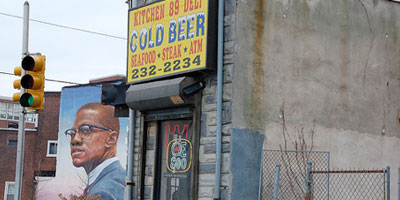Fellowship Highlights: Photo-Voice, Investigating Bad Doctors, and Building Resiliency as a Path to Health
I had a hunch that Carolyn Cannuscio had a story teller's heart when she plucked out this detail from a Philadelphia city-dweller account of gentrification: ‘One woman described the way she saw her "people being pulled out like sweet potatoes, roots and all-and their health has never been the same since.'"
Cannuscio, a social epidemiologist and Assistant Professor of Family Medicine and Community Health at the University of Pennsylvania, researches the causes and consequences of health disparities. She will be speaking to the Health Journalism Fellows this Thursday about her "Health of Philadelphia Photo-documentation Project."

While most epidemiologists content themselves with statistical analysis of datasets, Cannuscio came up with her photo-voice project while participating in the Santa Fe Science Writers Workshop. Just as journalists are experimenting with giving a greater voice to the community, Cannuscio, as a researcher, aims to upend some traditional approaches in population health by "engaging citizens, including students, in the research process." That includes recording the voices and stories of her subjects in a sound studio and arming them with cameras to chronicle health conditions in Philadelphia neighborhoods with very different income levels.
To Cannuscio's surprise, her interviews with local residents didn't focus on the dearth of health clinics; the need for more health care providers or rates of cancer or HIV. Instead, community members talked about social and economic woes: violence and safety, dilapidated housing and the wrecking ball's rude rebuke to familiar neighborhood haunts. You can hear a radio interview of Cannuscio here.
We'll also hear from S. Leonard Syme, Ph.D. during our four-day fellowship weekend. While teaching at UC Berkeley, Syme served as a mentor to many of today's public health legends, including Sir Michael Marmot, who chairs the World Health Organization's Commission on Social Determinants of Health. Professor Syme will talk to the fellows about how "fractured communities" can be healed.
And Michael Lu, M.D., an obstetrician and UCLA researcher, will discuss his research into one of public health's most troubling failures: the persistently high rates of preterm birth and infant death among African American babies. The medical establishment focuses so intently on causes during the nine months of pregnancy, Lu argues, that it overlooks other important influences on fetal and infant health in maternal health that happen long before conception.
Lu will also discuss his role in what is being called the most ambitious children's health study in U.S. history, the National Children's Study, which is just getting underway. It aims to follow 100,000 children from before birth through age 21 to document how environment and genes influence health and development. Lu will focus his work on studying 5000 children in Southern California. The study will involve sampling of air and water; placenta and core blood. Researchers hope their study will yield clues into "what causes autism; obesity; early onset Type 2 diabetes," Lu told me, as well as "how genes and environment interact and how genes are switched on and off during critical moments of development."
More Highlights:
Building Community Resiliency -- We visit Magnolia Family Center, which teaches life skills rather instead of providing handouts. The aim: to strengthen families, increase community involvement and improve health outcomes.
Life and Death Decisions - The Real Impact of Health Care Reform in California, with panelists Mary Agnes Carey, Kaiser Health News reporter and former Congressional Quarterly Capitol Hill Bureau Chief; Victoria Colliver, health reporter at the San Francisco Chronicle; and veteran health policy consultant, Peter Harbage.
Investigate local hospitals and their workers in a hands-on research workshop with Charles Ornstein, ProPublica senior reporter, Pulitzer Prize winner, and former Los Angeles Times reporter. Ornstein will talk about the techniques he used to win his Pulitzer as well as his new and ground-breaking investigation on pharmaceutical pay-offs to doctors.
Harness the power of your cell phone for cutting edge storytelling in the seminar, "Participatory Data Gathering Using Mobile Phones." Deborah Estrin, professor of computer science and founding director of the NSF-funded Center for Embedded Networked Sensing (CENS) at UCLA explains how common smart phone applications can be used to capture data and enrich journalism projects. Described as "participatory sensing," this new research technique provides interactive ways to involve the community in describing their own circumstances.
Never be stumped by statistics again. "Getting a Grip on Statistics: What's Right & Wrong with Numbers in the News" is a primer with Erika Franklin Fowler, Wesleyan University professor and former Robert Wood Johnson Scholar in Health Policy Research at the University of Michigan. Fowler helps journalists report on medical studies authoritatively. Her research tracks the errors health and medical reporters make when they misunderstand the numbers.
Learn how to avoid the unhealthy influence of spin masters in an interactive workshop led by Dr.Robert Davis, author of "The Healthy Skeptic: Cutting Through the Hype about Your Health." His presentation, "Reporting Health News with Context & Balance" is a road map to getting it right, with a presenter who has more than 20 years of experience as a health and medical journalist.
We will be live blogging Cannucsio's talk, as well as our other seminars, from Thursday to Sunday on our Fellowships Blog. You can also follow us on twitter over the long weekend of workshops, with the hashtag #chjf. To learn more about our Health Journalism Fellows and their projects, read our round-up here.

